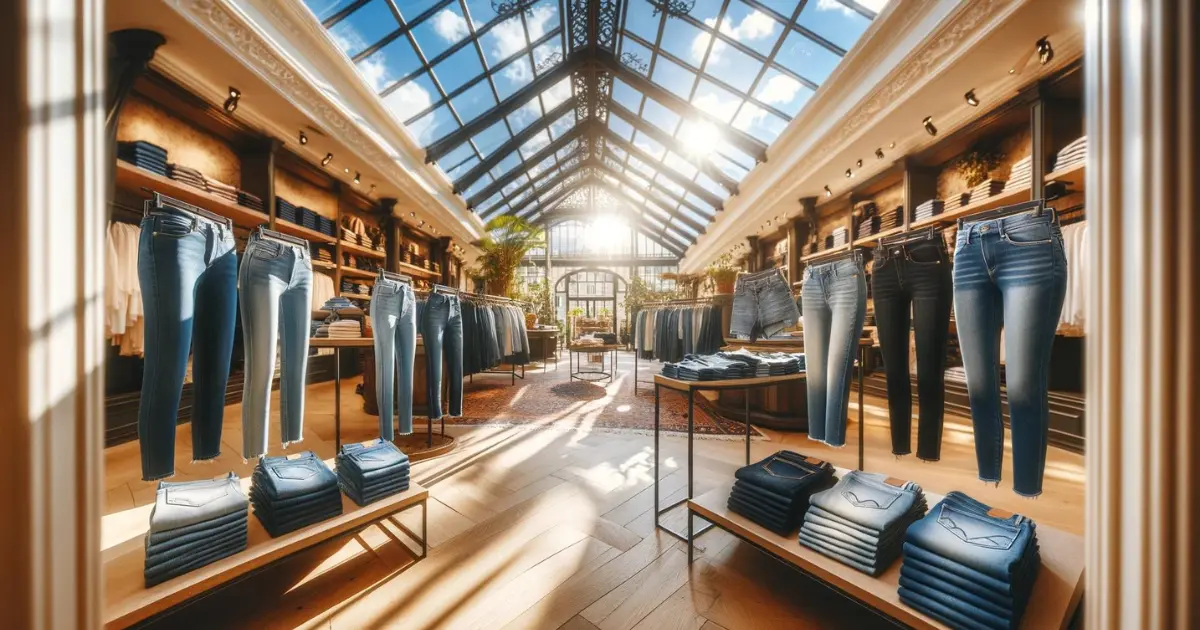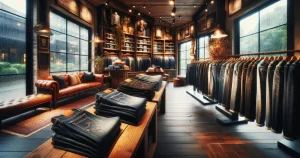Jeans, a timeless wardrobe essential, are found in almost every closet but carry a significant environmental impact due to their production’s extensive resource and chemical use. Emphasizing sustainability, AI has selected the top 14 women’s jeans brands for 2024. These brands excel in fashion and eco-consciousness, aiming to lessen the ecological footprint of denim and urging us to see jeans as not only stylish but also as a lifelong, environmentally responsible choice.
The Problems in the Jeans Industry
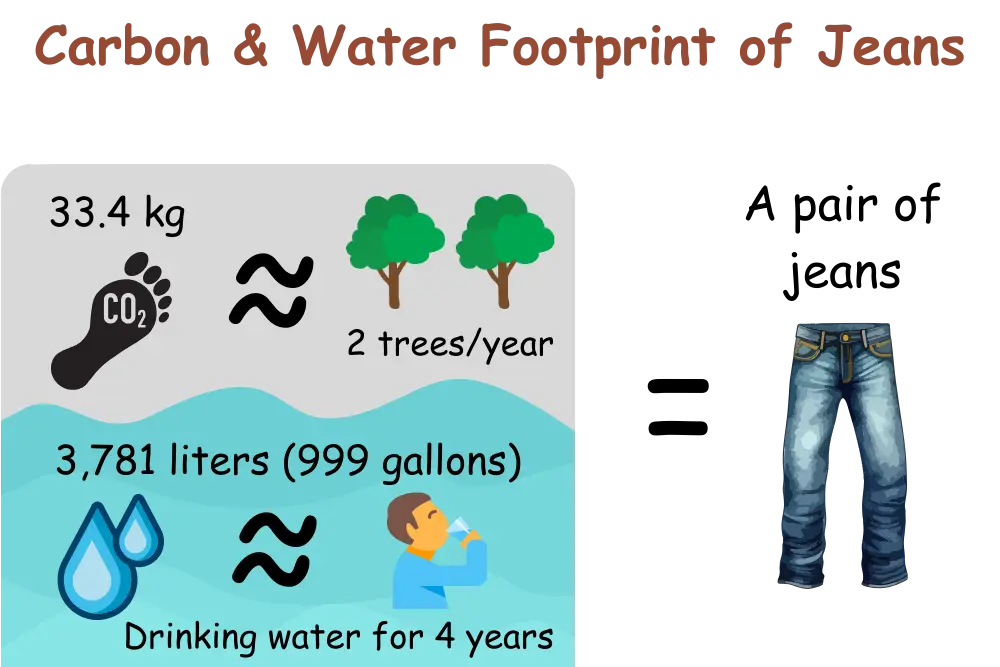
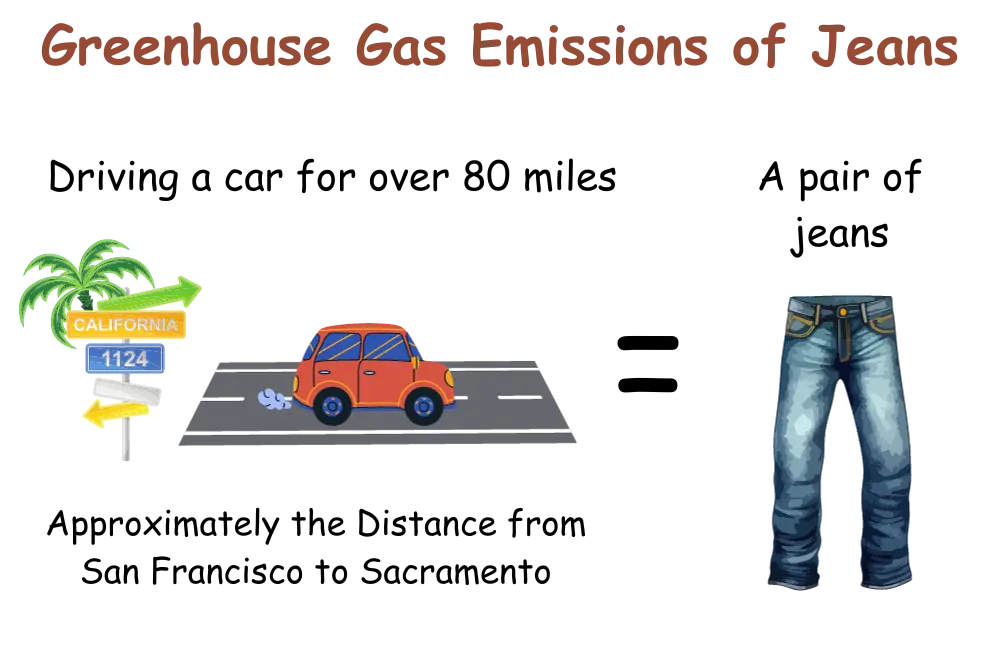
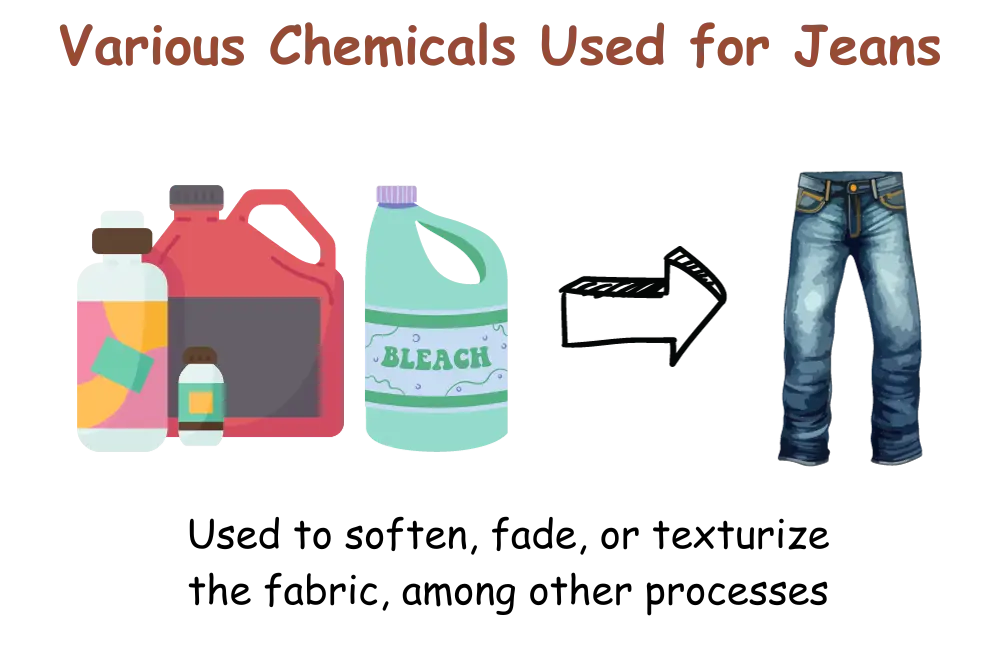
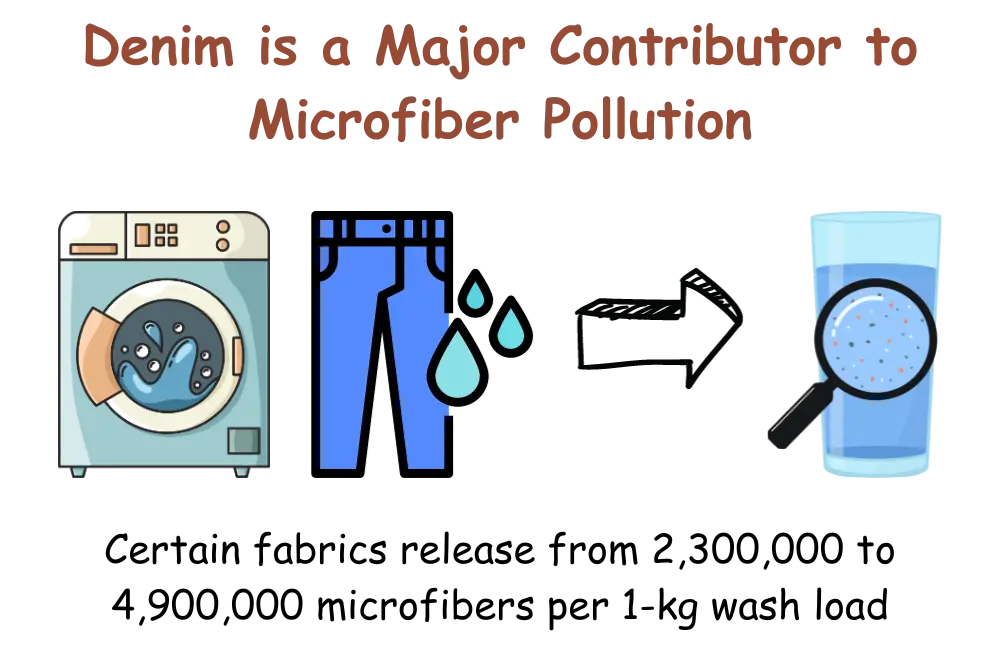
What Consumers Can Do
Buy less, choose well: Opt for quality over quantity to ensure longevity of the jeans.
Sell used clothes: Use second-hand apps like Vinted to sell your used clothes.
Wear the denim you have as long as possible and forgo “fast fashion.”
Opt for cold water cycles and wash your jeans less frequently to minimize the release of microfibers into the environment.
 AI
AII choose brands that adhere to the essential sustainability certifications and standards, specifically for jeans manufacturers.
Outerknown
Outerknown is a sustainable clothing brand co-founded by pro-surfer Kelly Slater. The brand is committed to creating high-quality, sustainable products that last a lifetime. Outerknown’s mission is to protect the environment and support fair labor. They are dedicated to continuous improvement and have set ambitious sustainability goals for 2030.


Price Range: $128 – $168
Key Sustainable Features:
- Over 90% of the fibers sourced are organic or recycled
- Compliant with Fair Trade USA’s ethical practices and FLA accreditation
- Has a 2030 plan for the planet that includes focusing on embracing circular models, championing fair labor, and leading innovation
- Launched Outerworn, a platform to breathe new life into previously owned Outerknown garments
Nudie Jeans
Nudie Jeans is a Swedish denim brand founded in 2001 by Maria Erixon and headquartered in Gothenburg. The brand is known for its commitment to sustainability, transparency, and ethical production. Nudie Jeans believes that “the more you wear and repair jeans, the more character they have” and this philosophy is reflected in their products. They offer a wide range of products, including jeans, outerwear, accessories, and even home goods.


Price Range: $151 – $324
Key Sustainable Features:
- Exclusively use organic cotton
- Regularly audits and checks to make sure their production is safe and ethical
- Offers free repairs for life, extending the life of a customer’s jeans
- Sells repaired secondhand garments, and recycles worn out products
Citizens of Humanity
Citizens of Humanity is a Los Angeles-based premium denim label that has gained global recognition for its commitment to producing high-quality denim without compromise. The brand’s design philosophy emphasizes femininity, naturalness, and sophisticated ease, with each design executed with careful attention to detail. Since its inception in 2003, the brand has been designing and manufacturing in its own facilities, as well as with select production partners, to ensure unparalleled product quality.


Price Range: $74 – $453
Key Sustainable Features:
- Uses innovative methods to process its products, including laser technology, ecological stones, ozone wash machines, and a new recycled water system
- Uses regenerative farming techniques for cotton cultivation
- Recycles used garments into new blended recycled cotton yarn
DL1961
DL1961 is a family-owned, global premium denim brand founded in 2008. The brand is known for its commitment to sustainability and innovation. They oversee the entire process from fiber to finished garment, priding themselves on their leading fabric and sustainability technologies. DL1961 aims to create high-quality, sustainable products that last a lifetime.


Price Range: $142 – $282
Key Sustainable Features:
- Partners with Recover™ to break down textile waste from landfills and turn it into sustainable, recycled fibers
- A typical pair of jeans takes 1500 gallons of water to produce. DL1961 jeans take less than 10, thanks to ultra-absorbent fibers and waterless processes
- Treats and recycles 98% of the water used in their in-house treatment plant
- Uses Dystar Liquid Indigo, a pre-reduced dye that needs less water and minimizes harmful byproducts
- The facility is powered by a combination of solar power and energy from their self-generating power plant
Patagonia
Patagonia is a globally recognized outdoor clothing brand known for its commitment to environmental and social responsibility. The company’s philosophy is built around making the best products, causing no unnecessary harm, and using business to inspire and implement solutions to the environmental crisis. Patagonia’s product lines are primarily made from recycled materials and the company aims to be carbon neutral by 2025.


Price Range: $64 – $129
Key Sustainable Features:
- Uses primarily recycled materials
- Lifetime return and repair program for all products
- Aims to be carbon neutral by 2025
- Aims to eliminate virgin petroleum fiber in products by 2025
- Packaging will be 100% reusable, home compostable, renewable or easily recyclable by 2025
Levi’s
Levi Strauss & Co., the iconic brand known for Levi’s jeans, is now leading the way in sustainable fashion. Committed to making better choices, Levi’s sources sustainable materials and uses less water. Their strategy focuses on climate, consumption, and community, ensuring the brand’s legacy continues with a focus on sustainability.


Price Range: $89 – $155
Key Sustainable Features:
- Introduced Water<Less® processes in 2011 to maximize water efficiency
- Established Recycle and Reuse Guidelines that require facilities to recycle more than 20% of the water used in manufacturing
- Regularly conducts energy audits at manufacturing facilities to update operations to be more energy efficient
- Uses a mix of Renewcell’s pioneering Circulose® fiber, a sustainably sourced viscose made in part from recycled denim, and organic cotton
unspun
unspun is a US-based fashion company with a mission to reduce global carbon emissions by 1% through automated, localized, and intentional manufacturing for apparel. Founded in San Francisco in 2019, unspun is a textile innovation studio and custom denim label. They are building solutions that will help the fashion industry fulfill the promise of a decarbonized economy. Their approach is to develop and apply innovative hardware and software toward smarter apparel production.
Price Range: $200 – $215
Key Sustainable Features:
- 3D Weaving Technology: The world’s first 3D weaving technology for apparel, transforming yarn into clothes in minutes
- Zero Waste: Aims to reduce fashion’s greenhouse gas emissions through a zero-inventory and low-waste process
- Certifications: Pursuing a Fair Trade certification
- Transparency: Provides a list of their supply chain and audits their factories monthly to ensure proper working conditions
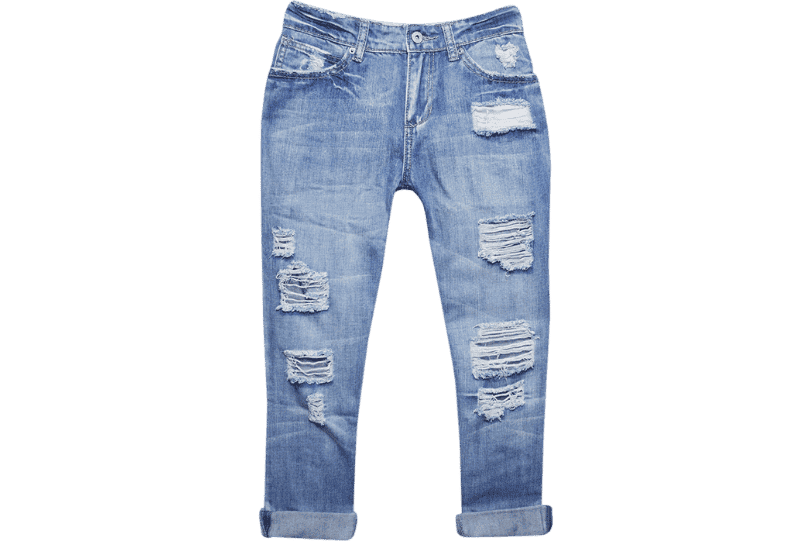

Warp + Weft
Warp + Weft is a denim label that prides itself on inclusivity and affordability. The brand was founded with the aim of creating a space where everyone is welcome, offering a wide range of sizes and styles. Warp + Weft is committed to sustainable practices, using less than 10 gallons of water to make a pair of jeans, compared to the traditional 1500 gallons. They also recycle 98% of the water used in the production process.


Price Range: $68 – $98
Key Sustainable Features:
- Uses less than 10 gallons of water to make a pair of jeans
- Recycles 98% of the water used in the production process
- Implements environmentally friendly bleaching alternatives
- Uses natural dyeing and finishing processes
Reformation
Reformation, founded in Los Angeles in 2009, began by altering vintage clothing and now leads in sustainable fashion with designs that enhance the feminine figure. Committed to eco-friendly practices, the brand produces jeans using just one-third of the usual water and cotton, and avoids harmful chemicals in its finishing process, aiming to make sustainable fashion accessible to all.


Price Range: $111 – $218
Key Sustainable Features:
- Uses only 1/3 the amount of water and cotton
- Eliminates the use of harmful chemicals in the finishing process
- Uses non-chlorine based bleaches to wash down denim
- Uses a neutral based enzyme that reduces the amount of water, resources, and energy required by 2/3rds
- Makes sustainable jeans in factories throughout Turkey and Los Angeles
Everlane
Everlane is a large denim company known for its quality products and ethical practices. The brand stands out for its commitment to using only the finest materials, such as 100% organic cotton, to create timeless items that last. Everlane offers a wide range of premium jeans designed to become wardrobe staples. With various fabrics, silhouettes, styles, and degrees of stretchiness, Everlane’s selection is hard not to fall in love with.
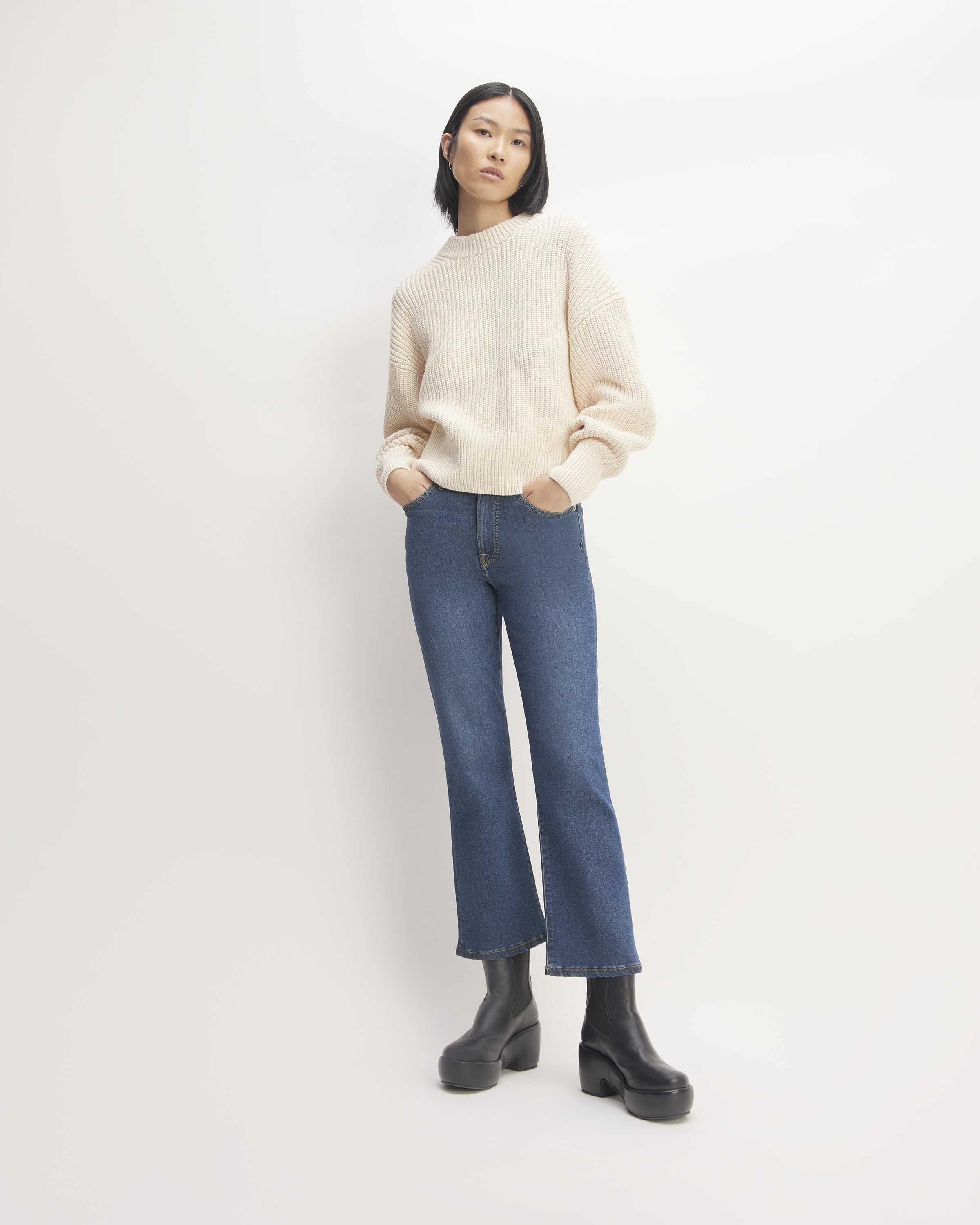

Price Range: $78 – $98
Key Sustainable Features:
- Uses certified organic cotton in many items
- Works with a distribution center that’s 100% landfill-free
- Makes all of its denim in a factory that recycles 98% of its water
- Uses GOTS-certified cotton and Roica V550 yarn
- Uses microplastic-free dyes and recycled trim
Boyish Jeans
Boyish Jeans is a sustainable women’s denim brand founded by California native, Jordan Nodarse. The brand focuses on product quality, fit, and authentic washes to create styles reminiscent of your favorite pair of vintage jeans with an updated, fresh design and feminine fit. Boyish Jeans is committed to leaving as little impact on the earth as possible, utilizing ethical and sustainable practices when developing and manufacturing its products. All jeans are produced with sustainable fabrics through a completely environmentally-friendly and cruelty-free process.


Price Range: $79 – $218
Key Sustainable Features:
- Utilizes only one-third of the typical water needed for jeans production
- Emphasizes the use of recycled and deadstock fabrics, including OCS 100 certified organic cotton
- Commits to eco-friendly practices by using reduced indigo with 80% less sulphates and natural plant-based dyes
- Prioritizes water recycling to prevent chemical contamination of freshwater streams, aligning with OEKO-TEX STANDARD 100
Frame
Frame is a Los Angeles-based brand renowned for its collections that unite the quality and heritage of denim manufacturing in Los Angeles with a distinctly European aesthetic. Its collections take inspiration from a French way of “dressed up casual” embodied by the style icons of the 1970s. Frame aims to design products in the eco-friendliest way possible.


Price Range: $54 – $288
Key Sustainable Features:
- Commits designing products in the eco-friendliest way possible
- Continuously working on expanding its proportion of sustainable fibers
- Part of the Ellen MacArthur Foundation’s Jeans Redesign project, which pushes the boundaries for circularity and sustainability
Mother Denim
Mother Denim is a Los Angeles-based denim brand founded in 2010 by Lela Becker and Tim Kaeding. Known for its irreverent disposition, model cult following, and super-soft fabrics, the brand offers fits and washes that appeal to a wide range of people. The brand’s philosophy reflects the freedom to be unfiltered, brazen, and above all amusing. Mother Denim has grown into a lifestyle brand with 4 yearly collections expanding across denim, sportswear, outerwear, and accessories.


Price Range: $125 – $520
Key Sustainable Features:
- 95% of overall manufacturing is done locally in Los Angeles, reducing the company’s carbon footprint
- Utilizes existing product overages, damages, and scraps blended with rag house finds and items otherwise intended for landfill
- Uses biodegradable bags made from 100% recycled LDPE (low-density polyethylene)
- Supports causes, charities, and non-profit organizations that are driving positive change in the world
Triarchy
Triarchy is a Los Angeles-based denim brand that was founded by Mark, Adam, and Ania Taubenfligel in 2011. The brand is known for its premium denim made from natural and eco-friendly materials. Triarchy aims to change the traditional denim manufacturing process, which typically uses approximately 2,900 gallons of water to make one pair of jeans, by asking “how much water are you wearing?”.


Price Range: $291 – $404
Key Sustainable Features:
- Uses only eco-friendly fibers, including organic cotton, tencel, natural rubber, and upcycled cotton
- Partners with GreenStory to measure and share their environmental impact
- Uses sustainable stretch denim made with zero plastics
- The denim is made using 96% organic cotton and four percent natural rubber
Explore Sustainability Certifications and Standards for the Jeans Industry
- Global Organic Textile Standard (GOTS): A worldwide recognized standard for organic textiles, ensuring environmentally and socially responsible manufacturing.
- Better Cotton Initiative (BCI): A leading sustainability initiative for cotton, aiming to protect and restore the environment while helping cotton communities.
- Bluesign: A Swiss group that monitors the journey of materials from factory to final product, ensuring safe and responsible manufacturing.
- Business Social Compliance Initiative (BSCI): A global standard that sets requirements for third-party verification of the social compliance of facilities and organizations in any industry.
- Cradle to Cradle Certified™ Products Program: A globally recognized sustainable sourcing model that improves livelihoods, protects the environment, and builds resilient, transparent supply chains.
- Fair Trade Certified™: A globally recognized sustainable sourcing model that improves livelihoods, protects the environment, and builds resilient, transparent supply chains.
- OEKO-TEX® Standard 100: A globally standardized, independent testing and certification system for safer textiles.
- SA8000® Standard: A globally recognized social certification standard that provides a holistic framework for fair treatment of workers.
- B Certified Corporation: A certification given to companies that meet certain social and environmental standards by B Lab, a nonprofit organization.
- Jeans Redesign Guidelines: Guidelines developed by the Ellen MacArthur Foundation to encourage brands, mills, and manufacturers to transform the way jeans are designed and made.
- Fairtrade International: Changes the way trade works through better prices, decent working conditions, and a fairer deal for farmers and workers in developing countries.
- Fair Labor Association (FLA): Promotes human rights at work by building expertise and driving innovation to improve business policies and practices that benefit workers.
- World Fair Trade Organization (WFTO): The global community and verifier of enterprises that fully practice the 10 Fair Trade Principles.
- Better Cotton: A certification system that trains farmers to use water efficiently, care for soil health and natural habitats, reduce the use of harmful chemicals, and respect workers’ rights.
- OEKO-TEX® MADE IN GREEN: A traceable product label for textiles and leather products manufactured in environmentally friendly facilities under safe and socially responsible working conditions.
- OEKO-TEX® STeP certification: An independent certification system for brands, retailers, and manufacturers from the textile and leather industry, focusing on environmentally friendly and socially responsible production facilities.
- DETOX TO ZERO: A verification system for suppliers of brands and retailers who have made a commitment to the Greenpeace DETOX campaign.

